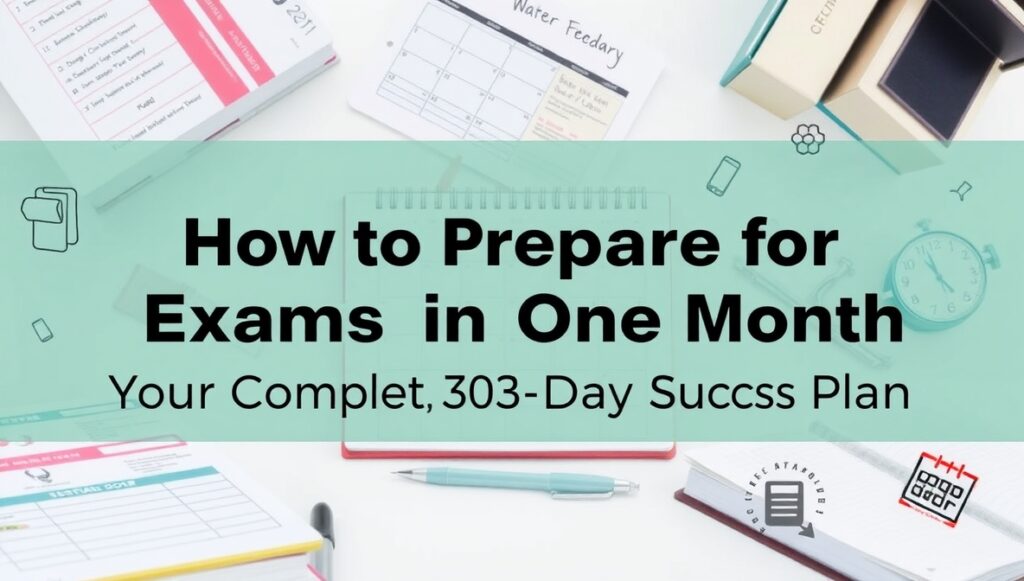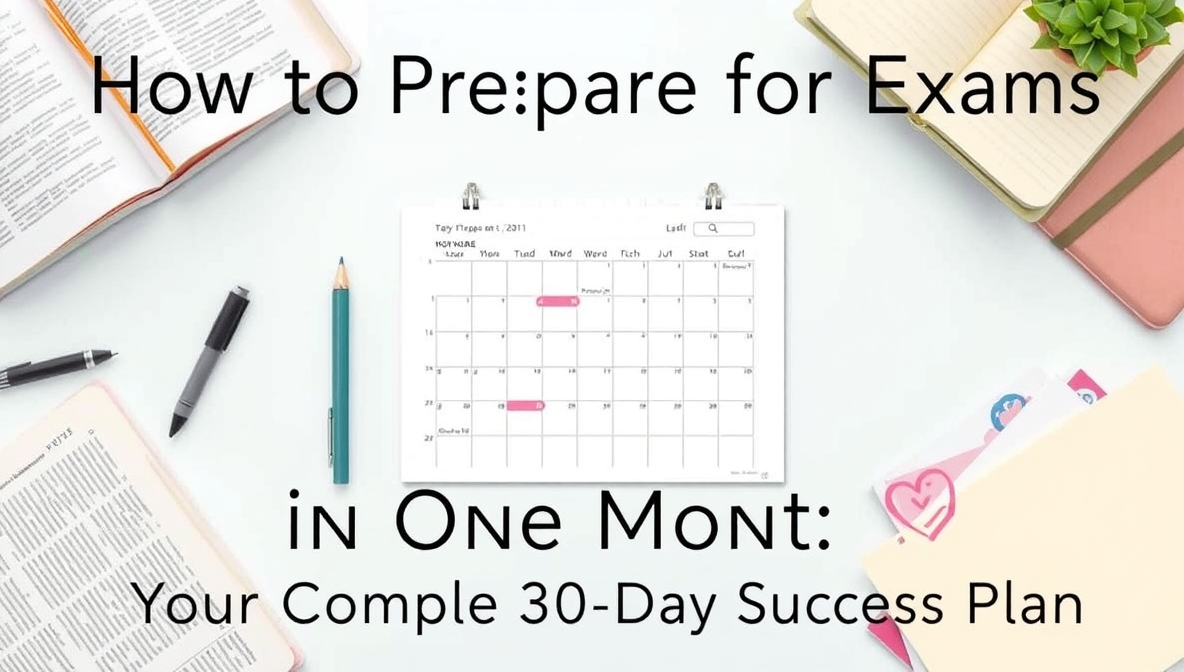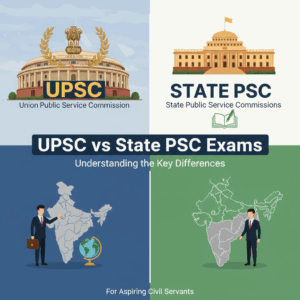One month can feel like an eternity or pass in the blink of an eye—the difference lies entirely in how strategically you use that time. With 30 days until your exams, you have enough time to thoroughly prepare, build confidence, and achieve excellent results, but only if you approach preparation with a systematic, scientifically-backed plan that maximizes every day while maintaining your physical and mental well-being.

This comprehensive 30-day exam preparation guide combines decades of educational research with proven student success strategies to create a complete roadmap for exam excellence. Whether you’re facing final exams, standardized tests, or professional certifications, this plan will help you transform initial anxiety into confident mastery through structured preparation that builds momentum and ensures peak performance when it matters most.
The key to successful one-month exam preparation isn’t working harder—it’s working strategically. This plan balances intensive study periods with essential recovery time, combines multiple learning techniques for maximum retention, and builds in flexibility to accommodate your unique circumstances and learning style.
Week 1: Foundation and Assessment (Days 1-7)
Day 1: Complete Academic Audit and Goal Setting
Morning (2-3 hours): Comprehensive Subject Assessment
Begin with a complete inventory of what you need to learn:
- Gather all materials: Textbooks, notes, assignments, previous exams, study guides
- List all exam topics: Create a master list of every subject and topic that will be covered
- Assess current knowledge: Rate your confidence level (1-10) for each topic
- Identify weak areas: Highlight subjects scoring 6 or below—these need priority attention
- Calculate study time needed: Estimate hours required for each subject based on complexity and current knowledge
Afternoon (2 hours): Strategic Planning
Create your master schedule:
- Available study hours: Calculate realistic daily study time considering classes, work, and other commitments
- Subject allocation: Assign study time based on exam weight and current knowledge level
- Priority ranking: List subjects from most challenging/important to least
- Milestone setting: Establish weekly goals for each subject
Evening (1 hour): Environment and Resource Setup
- Organize study space: Create a dedicated, distraction-free study environment
- Gather resources: Ensure you have all necessary materials, highlighters, notebooks, and technology
- Digital setup: Install apps for scheduling, flashcards, and focus (Forest, Anki, Google Calendar)
- Emergency contacts: List classmates, study group members, and instructor contact information
Days 2-3: Content Mapping and Gap Analysis
Content Mapping Process (4-5 hours daily):
Morning Session: Focus on your most challenging subject
- Chapter/topic overview: Read through main headings and summaries
- Concept mapping: Create visual representations of how topics connect
- Initial problem-solving: Attempt practice questions to identify specific skill gaps
- Question bank creation: Write down areas where you need clarification
Afternoon Session: Secondary priority subject
- Active reading: Engage with material through note-taking and questioning
- Example analysis: Work through provided examples step-by-step
- Self-testing: Quiz yourself on basic concepts and definitions
- Resource identification: Find additional materials for unclear concepts
Evening Session: Quick review and planning
- Daily reflection: What did you learn? What needs more attention?
- Next day preparation: Set specific goals for tomorrow’s study sessions
- Brief review: Spend 30 minutes reviewing today’s material
Days 4-5: Study System Implementation
Technique Integration (5-6 hours daily):
Active Recall Practice:
- Blank page method: Write everything you remember about a topic without referring to notes
- Teach-back technique: Explain concepts aloud as if teaching someone else
- Question generation: Create your own test questions and answer them
- Memory retrieval drills: Practice recalling information with increasing difficulty
Spaced Repetition Setup:
- Digital flashcards: Create Anki decks for key terms, formulas, and concepts
- Review scheduling: Set up automatic review intervals for optimal retention
- Progress tracking: Monitor which cards are difficult and need more frequent review
- Cross-subject connections: Link related concepts from different subjects
Note Organization:
- Condensed summaries: Create one-page summaries for each major topic
- Visual aids: Develop mind maps, diagrams, and charts for complex processes
- Formula sheets: Compile all important equations and formulas in one place
- Quick reference guides: Create cheat sheets for rapid review
Days 6-7: Initial Practice Testing and Adjustment
Practice Exam Implementation:
- Timed practice tests: Take full-length practice exams under realistic conditions
- Weakness identification: Analyze mistakes to identify patterns and knowledge gaps
- Strategy testing: Experiment with different approaches to various question types
- Time management: Practice pacing to ensure you can complete exams within time limits
Plan Refinement:
- Schedule adjustment: Modify your study plan based on practice test results
- Resource reallocation: Shift more time to areas revealed as weak
- Technique evaluation: Assess which study methods are most effective for you
- Goal adjustment: Refine weekly goals based on actual progress and capabilities
Week 2: Intensive Learning and Skill Development (Days 8-14)
Days 8-10: Deep Dive into Priority Subjects

Intensive Study Protocol (6-7 hours daily):
Morning Power Sessions (3 hours):
- Focused learning blocks: 90-minute sessions on your most challenging subject
- Active engagement: Combine reading with note-taking, diagram creation, and problem-solving
- Concept mastery: Don’t move to new topics until you truly understand current material
- Immediate application: Practice problems or applications immediately after learning concepts
Afternoon Integration (2-3 hours):
- Cross-topic connections: Identify relationships between different concepts within subjects
- Synthesis practice: Combine multiple concepts to solve complex problems
- Real-world applications: Connect abstract concepts to practical examples
- Teaching practice: Explain complex ideas using simple language and analogies
Evening Consolidation (1-2 hours):
- Daily review: Summarize key learning points from the day
- Flashcard creation: Add new concepts to your spaced repetition system
- Next-day preview: Briefly preview tomorrow’s material to prepare your brain
- Reflection journaling: Note what worked well and what needs adjustment
Days 11-12: Secondary Subject Mastery
Balanced Approach (5-6 hours daily):
Split attention between remaining subjects:
- Time allocation: Divide study time based on exam weight and current proficiency
- Technique variation: Use different study methods for different subjects to prevent monotony
- Integration opportunities: Look for connections between subjects when possible
- Practice diversity: Include various question types and difficulty levels
Skill Development Focus:
- Problem-solving strategies: Develop systematic approaches to different problem types
- Critical thinking: Practice analysis, evaluation, and synthesis of information
- Test-taking techniques: Learn to identify key words, eliminate wrong answers, and manage time
- Stress management: Practice relaxation techniques to use during actual exams
Days 13-14: Comprehensive Review and First Major Assessment
Review Protocol:
- Systematic coverage: Review all subjects using your condensed notes and summaries
- Weakness targeting: Spend extra time on previously identified problem areas
- Speed building: Practice faster recall and problem-solving to build efficiency
- Confidence building: Focus on areas where you’ve made significant improvement
Major Practice Test Battery:
- Full simulation: Take practice exams for all subjects under realistic conditions
- Performance analysis: Detailed review of results to identify remaining gaps
- Strategy refinement: Adjust test-taking strategies based on practice performance
- Confidence assessment: Gauge your readiness and adjust final weeks accordingly
Week 3: Mastery and Application (Days 15-21)
Days 15-17: Advanced Application and Integration
Higher-Order Thinking Development (5-6 hours daily):
Analysis and Synthesis:
- Case study analysis: Apply knowledge to complex, multi-faceted scenarios
- Comparative analysis: Compare and contrast different concepts, theories, or approaches
- Problem decomposition: Break complex problems into manageable components
- Solution evaluation: Assess different approaches to determine optimal solutions
Creative Application:
- Novel problem solving: Tackle unfamiliar problems using established principles
- Cross-disciplinary connections: Apply concepts from one subject to problems in another
- Real-world relevance: Connect academic knowledge to current events or practical situations
- Innovation practice: Develop creative solutions and alternative approaches
Days 18-19: Intensive Weak Area Remediation
Targeted Improvement Strategy:
- Focused sessions: Dedicate extra time to your lowest-scoring practice test areas
- Alternative learning methods: Try different approaches for persistently difficult concepts
- Expert consultation: Seek help from instructors, tutors, or knowledgeable peers
- Resource diversification: Use multiple textbooks, online resources, and practice materials
Mastery Verification:
- Progressive testing: Regular quizzes to ensure improvement in weak areas
- Peer teaching: Explain difficult concepts to others to solidify understanding
- Self-assessment: Honest evaluation of progress and remaining challenges
- Confidence building: Celebrate improvements and maintain positive momentum
Days 20-21: Comprehensive Integration and Second Major Assessment
Integration Activities:
- Subject synthesis: Create comprehensive overviews showing connections between all subjects
- Scenario planning: Practice applying knowledge in various hypothetical exam scenarios
- Strategy optimization: Finalize your approach to different question types and subjects
- Mental rehearsal: Visualize successful exam performance and problem-solving processes
Assessment and Calibration:
- Full practice exam battery: Complete practice tests for all subjects
- Performance comparison: Compare results to previous week’s tests to measure improvement
- Final gap identification: Pinpoint any remaining knowledge or skill deficiencies
- Confidence calibration: Align confidence levels with actual performance capabilities
Week 4: Optimization and Peak Performance (Days 22-28)
Days 22-24: Precision Tuning and Strategy Refinement
Fine-Tuning Protocol (4-5 hours daily):
Knowledge Optimization:
- High-impact review: Focus on concepts most likely to appear on exams
- Formula mastery: Ensure automatic recall of all important equations and procedures
- Fact verification: Double-check frequently confused details and specifics
- Context practice: Practice applying knowledge in various question formats
Strategy Perfection:
- Time management mastery: Perfect your pacing for each type of exam
- Question analysis techniques: Refine ability to quickly identify what questions are asking
- Answer selection strategies: Optimize approaches for multiple choice, essay, and problem-solving questions
- Error prevention: Develop systems to catch and correct common mistakes
Days 25-26: Confidence Building and Stress Management
Performance Psychology (3-4 hours daily):
Confidence Development:
- Success visualization: Mental rehearsal of successful exam performance
- Positive self-talk: Develop encouraging internal dialogue for challenging moments
- Achievement recognition: Acknowledge the progress you’ve made over the month
- Capability affirmation: Focus on what you know and can do well
Stress Management Systems:
- Relaxation techniques: Practice deep breathing, progressive muscle relaxation, or meditation
- Physical preparation: Ensure proper sleep, nutrition, and exercise routines
- Contingency planning: Prepare responses to potential exam-day challenges
- Support system activation: Connect with friends, family, or counselors for encouragement
Days 27-28: Final Review and Exam Preparation
Light Review Protocol (2-3 hours daily):
Final Knowledge Check:
- Summary review: Quick pass through all major concepts and formulas
- Flashcard final run: Complete final review of spaced repetition materials
- Quick practice: Brief practice sessions to maintain sharpness without overexertion
- Clarification completion: Resolve any remaining minor questions or confusions
Logistical Preparation:
- Exam schedule confirmation: Verify times, locations, and requirements for all exams
- Material organization: Prepare all necessary supplies, calculators, and permitted materials
- Route planning: Confirm transportation and timing for each exam location
- Backup preparation: Have contingency plans for potential exam-day complications
Daily Optimization Strategies Throughout the Month
Time Management Techniques
The Pomodoro Plus System:
- Deep work blocks: 90-minute focused sessions for complex material
- Standard blocks: 45-minute sessions for moderate difficulty material
- Review blocks: 25-minute sessions for familiar material review
- Break optimization: 5-15 minute breaks with physical movement and mental reset
Energy Management:
- Peak hours identification: Schedule most challenging material during your high-energy periods
- Energy matching: Align task difficulty with current energy levels
- Recovery planning: Include adequate rest and relaxation time
- Burnout prevention: Monitor stress levels and adjust intensity accordingly
Learning Enhancement Strategies
Multi-Modal Learning:
- Visual: Mind maps, diagrams, color-coding, and visual associations
- Auditory: Reading aloud, discussion groups, and verbal explanation practice
- Kinesthetic: Writing notes by hand, physical manipulation of concepts, and movement during study
- Social: Study groups, peer teaching, and collaborative problem-solving
Memory Consolidation:
- Sleep optimization: Ensure 7-8 hours of quality sleep for memory consolidation
- Exercise integration: Regular physical activity to enhance cognitive function
- Nutrition support: Brain-healthy foods and proper hydration
- Stress management: Techniques to prevent stress-induced memory impairment
Emergency Protocols and Contingency Planning
When You Fall Behind
Rapid Recovery Strategy:
- Priority triage: Focus on highest-impact, most learnable material
- Study method intensification: Increase use of most effective techniques
- Resource mobilization: Seek additional help from instructors, tutors, or peers
- Schedule compression: Temporarily increase study hours while maintaining health
Selective Studying:
- High-probability topics: Focus on material most likely to be tested
- Foundation concepts: Ensure mastery of fundamental principles
- Skill over content: Prioritize problem-solving skills over memorization when time is limited
- Strategic sacrifices: Make informed decisions about what to deprioritize
Managing Exam Anxiety
Anxiety Prevention:
- Preparation confidence: Thorough preparation reduces anxiety naturally
- Realistic expectations: Set achievable goals based on preparation level
- Perspective maintenance: Remember that exams are one measure among many
- Support utilization: Connect with counselors, friends, or family when needed
Anxiety Management Techniques:
- Breathing exercises: Simple techniques for immediate stress relief
- Progressive relaxation: Systematic tension release for physical stress
- Cognitive restructuring: Challenge negative thoughts with realistic assessments
- Mindfulness practice: Stay present-focused rather than worry about outcomes
The Final 48 Hours: Peak Performance Protocol
Two Days Before Exams
Light Review Only:
- Confidence maintenance: Review well-known material to maintain confidence
- Final clarifications: Address any last minor questions
- Stress prevention: Avoid intensive studying that could increase anxiety
- Physical preparation: Ensure proper rest, nutrition, and exercise
Day Before Exams
Minimal Study Protocol:
- Quick review: 30-60 minutes maximum of light review
- Material organization: Prepare all exam supplies and logistics
- Relaxation focus: Emphasize stress management and mental preparation
- Early bedtime: Prioritize sleep over last-minute cramming
Exam Day Success
Pre-Exam Routine:
- Healthy breakfast: Fuel your brain with appropriate nutrition
- Arrival timing: Arrive early but not too early to avoid pre-exam anxiety
- Final mental preparation: Brief positive visualization and confidence affirmation
- Stress management: Use practiced relaxation techniques as needed
Measuring Success and Learning from the Experience
Performance Assessment
Quantitative Measures:
- Practice test improvement: Compare early and late practice test scores
- Knowledge retention: Test recall of information after breaks in studying
- Speed improvement: Measure increases in problem-solving speed
- Accuracy enhancement: Track reduction in careless errors
Qualitative Indicators:
- Confidence levels: Assess your confidence in different subject areas
- Understanding depth: Evaluate quality of comprehension beyond memorization
- Application ability: Test capacity to apply knowledge in new contexts
- Stress management: Monitor improvement in handling academic pressure
Future Improvement Planning
Strategy Evaluation:
- Technique effectiveness: Identify which study methods worked best
- Time allocation success: Assess whether time distribution was optimal
- Resource utilization: Evaluate effectiveness of different learning materials
- Schedule sustainability: Determine if the pace was manageable and effective
Skill Development Recognition:

- Learning skills: Acknowledge improvements in study techniques and learning efficiency
- Time management: Recognize enhanced ability to plan and execute study schedules
- Stress management: Note increased capacity to handle academic pressure
- Self-awareness: Appreciate better understanding of personal learning preferences and capabilities
Conclusion: From Anxiety to Excellence in 30 Days
One month of strategic exam preparation can transform academic anxiety into confident competence, but only when that time is used systematically and intelligently. This 30-day plan provides a framework that balances intensive learning with sustainable practices, ensuring you reach exam day prepared, confident, and performing at your peak capability.
The key to success lies not in heroic last-minute efforts but in consistent, strategic preparation that builds knowledge systematically while maintaining physical and mental well-being. Each week of this plan serves a specific purpose: Week 1 establishes foundations and identifies priorities, Week 2 develops deep understanding and skills, Week 3 focuses on application and integration, and Week 4 optimizes performance and builds confidence.
Remember that this plan is a template to customize based on your specific subjects, learning style, and circumstances. The principles remain constant—systematic preparation, balanced study techniques, regular assessment, and strategic time management—but the details should reflect your unique needs and goals.
As you implement this plan, maintain perspective about the role of exams in your broader educational journey. While academic performance matters, the study skills, self-discipline, and resilience you develop through systematic preparation serve you far beyond any single test. The confidence that comes from thorough, strategic preparation becomes a foundation for lifelong learning success.
Your 30-day journey from initial anxiety to exam excellence begins with a single step: committing to the systematic approach outlined in this plan. Trust the process, stay consistent with implementation, and adjust details as needed while maintaining the overall structure. With strategic preparation, what initially seemed overwhelming becomes entirely manageable, and what felt impossible becomes achievable.
The transformation from anxious procrastination to confident competence happens one day at a time, one study session at a time, one small victory at a time. Your success is not determined by your starting point but by your commitment to systematic improvement over the next 30 days. Begin today, and discover what you can achieve when strategic preparation meets dedicated effort.



